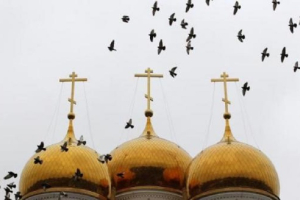Christianity has made a "comeback" in Europe, becoming a significant part of individual and national identity since the fall of the Iron Curtain in 1991, according to new research.
The Pew Research Center recently released the results of a survey regarding the religious landscape in Central and Eastern Europe. The survey was conducted face to face, with the respondents aged 18 years or older.
According to the results, there has been a sharp increase in the number of Orthodox Christians in the region, most notably among Russians. In 1991, only 37 percent of adults in Russia identified themselves as Orthodox, but in the recent survey, 71 percent identified themselves as Orthodox.
Additionally, the number of adults who identified as atheist, agnostic or having no particular religion has decreased not just in Russia, but in Ukraine and Bulgaria as well.
Adults who identified as Catholics have also decreased in the region since 1991, particularly in Poland, Hungary and the Czech Republic.
The survey found that people strongly associate religion with national identity. In Greece, for example, an overwhelming 76 percent said that being Orthodox is integral to being "truly Greek." And in Poland and the Russian Federation, majority of adults surveyed said that being Orthodox or Catholic is part of being "truly Polish" or "truly Russian."
However, the respondents' strong association between religion and national identity is not always indicative of them being "highly observant" of religious practices based on how often they pray and how often they attend religious services. The survey revealed that only a few Orthodox Christians said they attend worship services at least once a week.
Socially conservative views remain prevalent in Orthodox-majority countries, according to the survey.
"Overwhelming shares of respondents in many of the countries surveyed say homosexuality should not be accepted by society, with people in Orthodox-majority countries especially likely to take this position," Pew Research Center's Michael Lipka and Neha Sahgal wrote.
"Orthodox-majority populations also are more likely than others to say abortion should be mostly or entirely illegal and to hold more conservative views on gender norms, such as saying that wives should always obey their husbands," they added.
Majority of the respondents in Orthodox-majority countries believe the government should support the church either financially or through other means.
"Roughly a third or more of respondents in every Orthodox-majority country surveyed say government policies should support the spread of religious values and beliefs in their country, and even bigger shares in most of these places say their national Orthodox church should receive financial support from the government," Lipka and Sahgal wrote.

















